If you’re a beginner gardener, it can be overwhelming to figure out where to start. Luckily, there are many easy-to-grow plants that are perfect for beginners. Here is a list of 10 best starter garden plants for beginners:
Key Takeaways
- Starting a garden as a beginner can be overwhelming, but with the right plants, you can have a successful gardening experience.
- Lettuce, garlic, onions, zucchini, cherry tomatoes, cucumbers, sugar snap peas, daikon radish, potatoes, and herbs are all great starter garden plants for beginners.
- Choose a sunny spot with well-drained soil, start with a small garden or raised bed, and plant vegetables you enjoy eating.
Lettuce – Perfect for Beginner Gardeners
Lettuce is easy to grow and can tolerate shade. Plant a mixture of leaf lettuces for a variety of flavors. These easy-to-grow plants are perfect for beginner gardeners looking for a continuous supply of fresh salad greens. Lettuce prefers well-draining soil and moderate sun, making it an ideal choice for gardens with partial shade.
For successful cultivation, sow lettuce seeds in early spring or late summer. Keep the soil moist but not waterlogged, and thin out the seedlings once they are a few inches tall. Leaf lettuces can be harvested as soon as the leaves are large enough to use, while head lettuces should mature before picking.
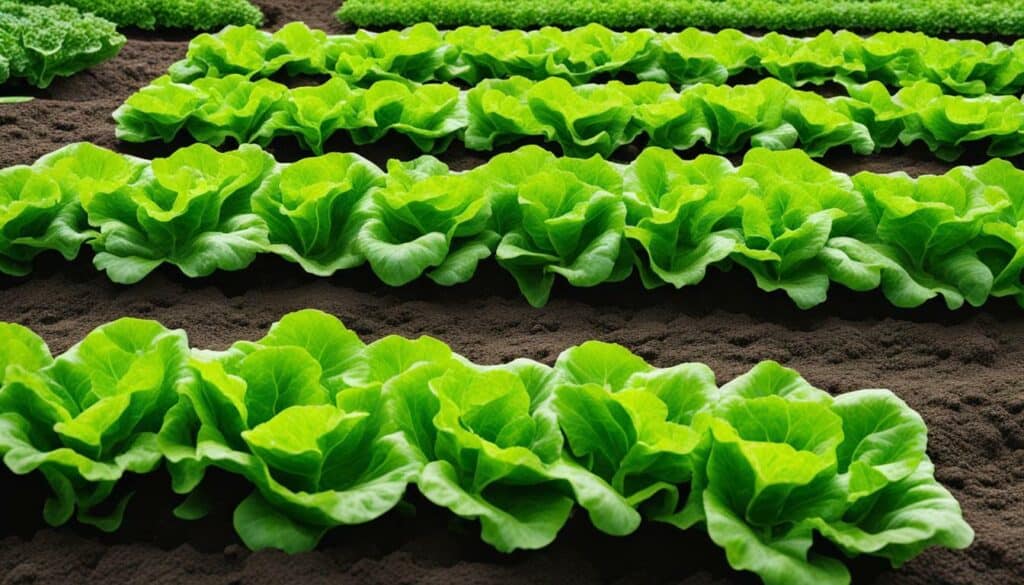
Lettuce is easy to grow and can tolerate shade. Plant a mixture of leaf lettuces for a variety of flavors.
Swiss Chard – A Colorful and Versatile Addition to Your Garden
Swiss Chard is a leafy green vegetable that keeps on giving. It can be used cooked or raw, and the Rainbow variety is especially pretty. This colorful and versatile vegetable is perfect for beginner gardeners, as it is easy to grow and can be planted both in the spring and fall. With continuous succession planting, you can have Swiss Chard available almost year-round.
Unlike spinach and kale, Swiss Chard is not prone to bolting, making it a reliable choice for your garden. Its leaves are crunchy and slightly bitter, and they can be used in a variety of dishes. You can sauté them with garlic and olive oil, add them to soups and stews, or chop them up and add them to salads for a nutritious crunch.
The Rainbow variety of Swiss Chard is particularly attractive with its vibrant colors, ranging from bright yellow to deep burgundy. The stalks are also colorful, ranging from pale yellow to deep pink. If you are looking for a highly productive variety, the white chard is an excellent choice.
However, it’s important to protect your Swiss Chard plants from birds, as they are known to eat the tender shoots. You can cover your plants with a net or mesh to keep them safe.
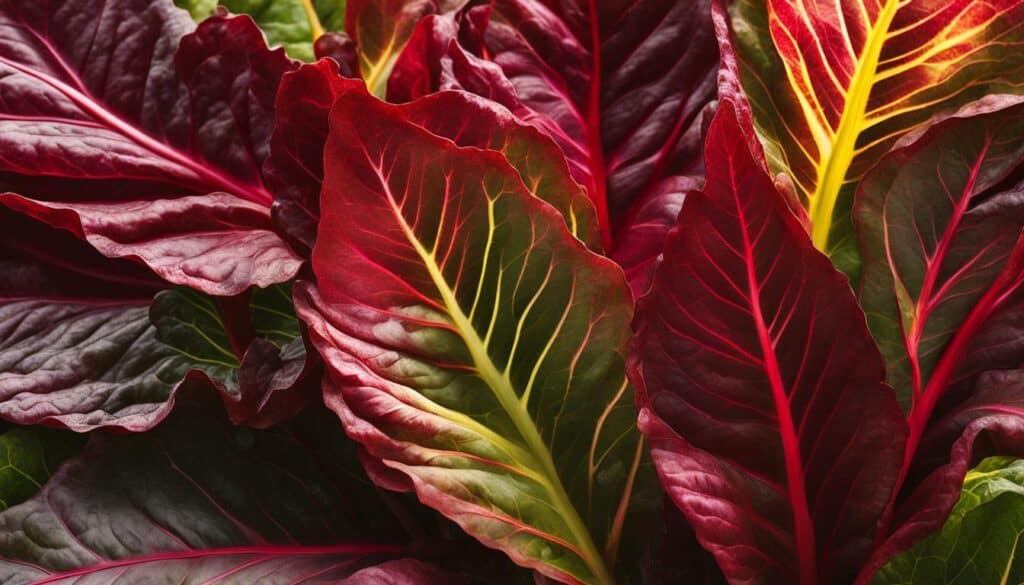
Overall, Swiss Chard is a great addition to any garden, whether you’re a beginner or an experienced gardener. Its versatility and reliability make it an excellent choice for those looking to start a vegetable garden.
Beans – Productive and Soil-Enriching Plants for Beginners
Beans are productive and give nutrients back to the soil. They come in various types and colors, so you can experiment with different varieties. Choosing the right beans to grow is important, and depends on the type of dish you want to prepare with them. Some of the most popular varieties are green beans, lima beans, and black beans. Green beans are a favorite for beginners because they are easy to grow and harvest.
When planting beans, it’s important to choose a sunny location in your garden as they require at least six hours of sunlight each day. Beans grow best in nutrient-rich, well-draining soil, and it’s important to ensure that the soil is properly watered as they can dry out quickly. Adding compost or manure to the soil can help increase its nutrient content, which in turn, will improve bean growth and yield.
Beans are also known for being productive plants, producing a high yield of produce per plant. Additionally, they are great for enriching the soil, as they have the ability to fix nitrogen, which can be used by other plants in the garden. This means that even after harvesting, beans will continue to give back to the soil, making them an excellent choice for sustainable gardening.

It is recommended to plant beans after the last spring frost, when the soil has warmed up. Plant the seeds directly into the soil, making sure to space them out properly, as overcrowding can lead to poor growth and yield. As beans grow, it’s important to provide them with support, as they can grow quite tall. Using stakes or trellises can help keep the plants upright and make it easier to harvest the beans.
Whether you’re looking to grow green beans, lima beans, or black beans, they are all great choices for beginner gardeners. They are easy to grow, productive, and can enrich the soil, making them an excellent addition to any vegetable garden.
Potatoes – An Easy and Rewarding Crop for Beginners
You can easily grow potatoes from old potatoes that are sprouting. Just cut them in half or thirds and plant them in a deep hole. Hill them once or twice during the growing season.
Potatoes are an excellent beginner-friendly vegetable to grow in your garden. They can thrive in poor soil conditions and require very little maintenance until harvest time. Novice gardeners can purchase seed potatoes at a local nursery and successfully cultivate a bountiful crop.
For increased yield, cutting seed potatoes with multiple sprouts in half before planting is recommended. This will allow the plant to produce more potatoes. A fun variety to try is purple potatoes, which add a colorful twist to your garden and meals.
Potatoes are a rewarding crop that can be grown successfully by inexperienced gardeners. With minimal maintenance requirements and the ability to thrive in poor soil conditions, growing potatoes is a great way to start your gardening journey.
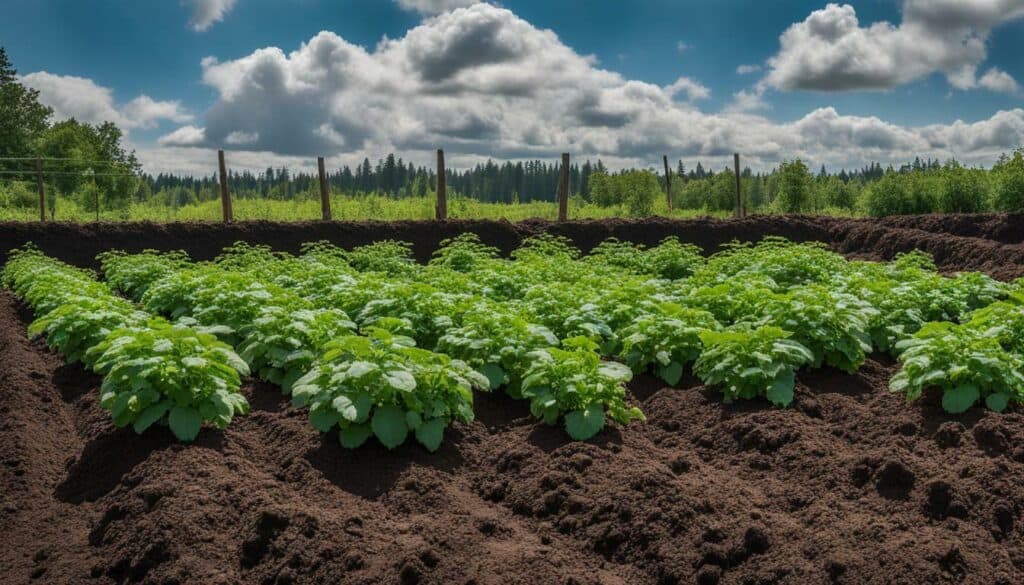
Zucchini – Low-Maintenance and Abundant in Produce
Zucchini is low-maintenance and produces a lot of produce. Plant 1 or 2 plants, unless you have a large family or enjoy giving away zucchini. It is a versatile vegetable that can be used in a variety of dishes, including salads, stir-fries, and pasta sauces. Zucchini plants are easy to grow and can thrive in containers or in the ground. They prefer consistently moist soil and plenty of sunlight, so make sure to water them regularly and choose a sunny spot in your garden.
Zucchini plants are also known for producing an abundance of zucchinis throughout the growing season, which makes them a great choice for beginner gardeners who want to see results quickly. In fact, a single zucchini plant can produce up to 10 pounds of zucchini throughout the season, so be prepared to have plenty of delicious zucchini to enjoy!
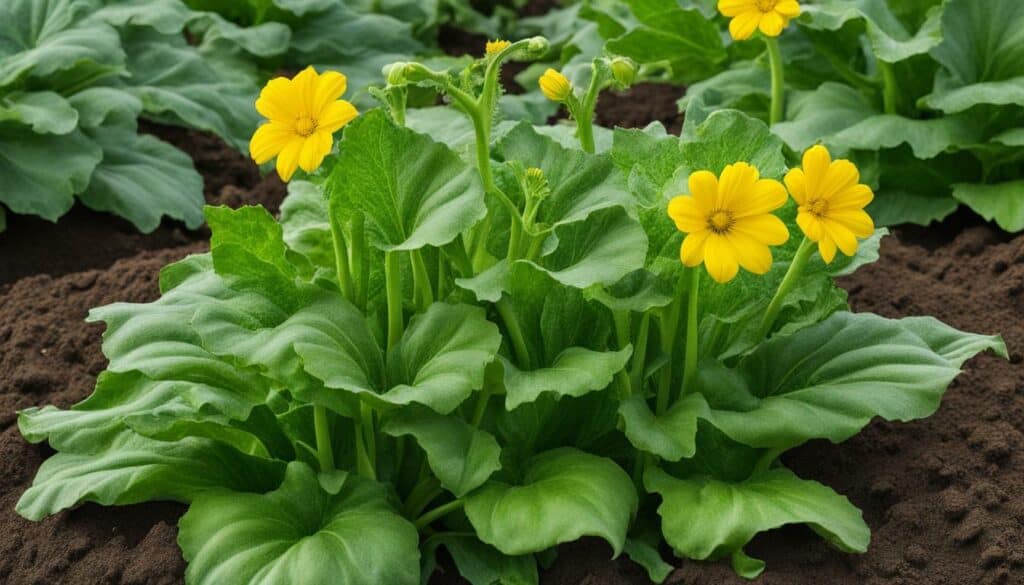
One of the best things about zucchini is that it is a low-maintenance vegetable. Once your plants are established, they don’t require a lot of attention. Just make sure to water them regularly and remove any weeds that may be growing around the base of the plant. Zucchini plants are also relatively pest-resistant, which means you can grow them without worrying too much about insect damage.
If you want to ensure a bountiful harvest, it’s a good idea to fertilize your zucchini plants with a nitrogen-rich fertilizer every two to three weeks. This will help to promote healthy growth and ensure that your plants produce plenty of zucchinis. When your zucchinis are ready to harvest, simply use a sharp knife or pruning shears to cut them off at the stem. Zucchinis are best when they are picked young and tender.
In summary, zucchini is a great choice for beginner gardeners who want to grow low-maintenance and abundant produce. With proper care and attention, your zucchini plants will thrive and produce an abundance of delicious zucchinis for you to enjoy throughout the growing season.
Tomatoes – A Must-Have for Beginner Gardeners
Cherry tomatoes are the easiest to grow, but any variety can be successful with consistent watering and plenty of sun. That’s why tomatoes are a highly recommended starter garden plant for beginners looking for easy-to-grow options. With their low-maintenance requirements, they offer a satisfying harvest for novice gardeners.
Cherry tomatoes are particularly recommended for beginners as they are smaller in size and less prone to issues like blossom end rot. However, other tomato varieties are also suitable for beginner gardeners.
If space is limited, tomatoes can even be grown in containers or on balconies. This makes them an excellent option for those without a large outdoor space.
Tomatoes are not only easy to grow but also offer a delicious taste. They can be used in a variety of dishes and can add a lovely pop of color to your garden. So why not add them to your beginner garden plant list?
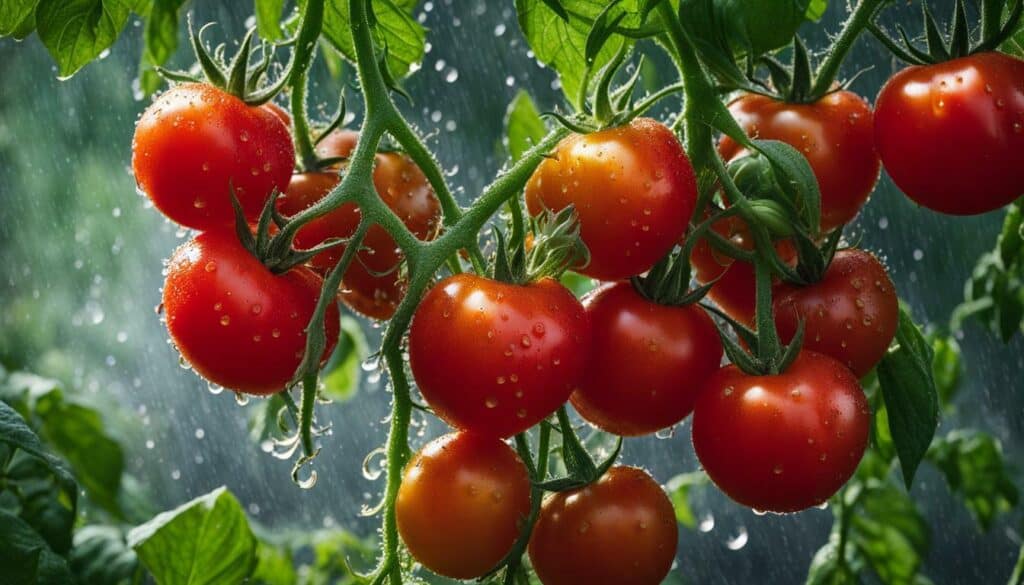
Carrots – Low-Maintenance Root Vegetables for Beginners
Carrots are low-maintenance and can be left in the ground all winter. Harvest in late July for baby carrots or after the first frost for larger ones. They are easy to grow and require little effort, making them a perfect choice for beginner gardeners.
Carrots can be planted in both the spring and fall. When planting, choose a location with well-draining soil and full sun. Sow the seeds directly into the ground, approximately 1/4 inch deep and 2-3 inches apart. Keep the soil moist and be patient as carrots can take up to two weeks to germinate.
One of the benefits of growing carrots is their disease resistance. However, it is important to keep an eye out for pests such as carrot rust flies and nematodes. To prevent these pests, cover the carrot bed with a floating row cover or plant onions and garlic nearby.
Carrots can be harvested when they are firm and bright in color. Depending on the variety, this can be anywhere from 50 to 80 days after planting. For baby carrots, harvest them when they are about 1/2 inch to 1 inch in diameter. For larger carrots, wait until they are 1 1/2 to 2 inches in diameter.
Carrots are not just tasty, they are also nutritious. They are high in beta-carotene, fiber, and vitamin K1. They can be eaten raw or cooked and are a great addition to salads, soups, and stews.
Other low-maintenance vegetables for beginners include lettuce, garlic, onions, zucchini, cherry tomatoes, cucumbers, sugar snap peas, daikon radish, and potatoes. Additionally, herbs such as basil, mint, rosemary, cilantro, and dill are easy to grow and add flavor to your dishes. Finally, flowers like daffodils, tulips, marigolds, zinnias, calendula, and forsythia are low-maintenance and can beautify your garden. Overall, these vegetables and herbs are great choices for beginner gardeners looking for low-maintenance options.
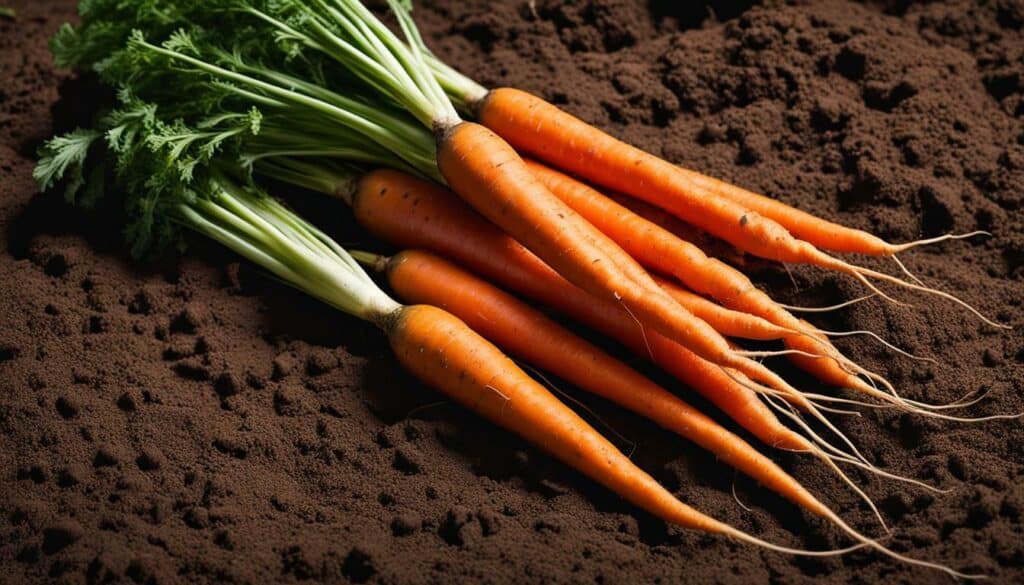
Winter Harvesting
If you live in a region with mild winters, you can leave your carrots in the ground and harvest them throughout the winter. Cover the bed with a thick layer of straw or leaves to protect them from frost. Alternatively, you can dig them up and store them in a cool, dark place such as a root cellar or basement.
Onions – Easy-to-Grow Alliums for Beginner Gardeners
As a beginner gardener, onions are a great option to add to your garden. They are an easy-to-grow allium that can be started from seed or onion sets, which are small onion bulbs.
Purchase onion sets instead of seeds for a better-sized onion. Onion sets produce larger onions, as they have already gone through the process of sprouting. When purchasing onion sets, look for ones that are firm and have not started to sprout yet.
Onions are low-maintenance and even if they don’t do well, you can still eat the onion greens. Plant them in well-draining soil in a sunny location in the spring. Onions are naturally disease-resistant, making them a great option for beginner gardeners.
Harvest onions once the tops have fallen and dried up. Once the tops of the onion plants have fallen over and turned brown, it’s time to harvest. Pull the onions out of the ground and leave them in the sun for a few days to dry out before storing them.
In addition to onions, there are several other easy-to-grow vegetables for beginner gardeners, such as lettuce, zucchini, tomatoes, beans, carrots, and beets. Swiss chard is another leafy green vegetable that is productive and easy to grow. For herbs, basil, mint, rosemary, and cilantro are good options for beginner gardeners. With a sunny location, well-draining soil, and regular watering, beginner gardeners can successfully grow a variety of vegetables and herbs in their garden.
Pumpkins – Fun and Rewarding Plants for Beginner Gardeners
Pumpkins are easy to start from seed and grow large. Choose a variety that is good for pies if you plan on making pumpkin puree. There are several pumpkin varieties to choose from, such as the Small Sugar Pie, Big Max, and Jack O’Lantern. Pumpkins prefer well-drained soil and plenty of sunlight, so make sure to select an appropriate location.
When planting, make sure to sow the seeds directly into the soil after the last frost. You can also start them indoors a few weeks before the last frost for an earlier harvest. Pumpkin plants require space to grow, so make sure to plant them about 6 feet apart. They also require consistent watering throughout the growing season.
One fun aspect of growing pumpkins is watching them mature. They will start as small green fruits and grow larger and change color over time. Once they’ve reached their mature size and color, it’s time to harvest them. Cut the pumpkin from the vine, leaving a few inches of stem, and let it cure for a few days in a warm spot with good air circulation.
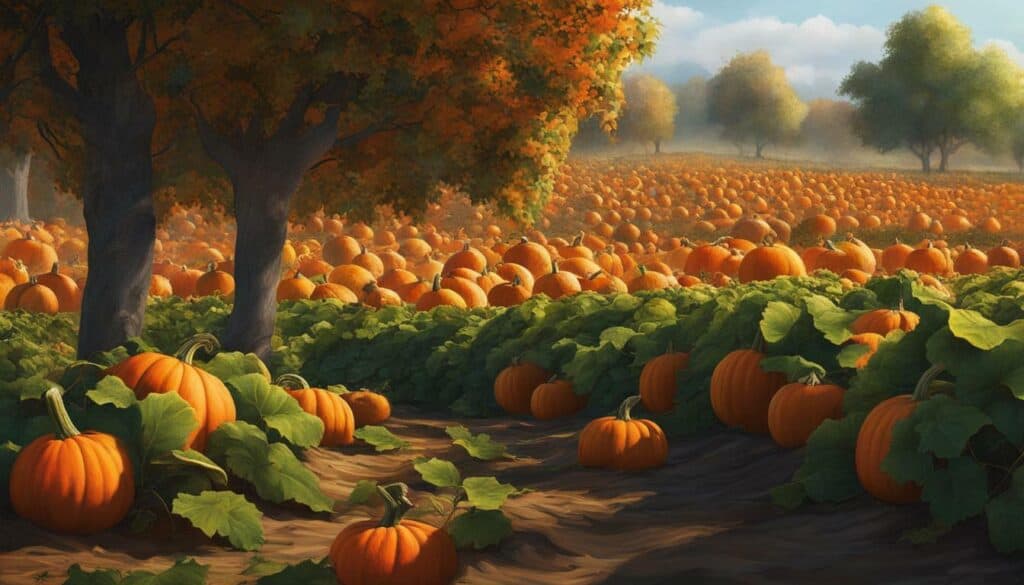
Aside from the fun of watching them grow, pumpkins can also be used for a variety of purposes. Carve them for Halloween, make pumpkin puree for pies and baked goods, or roast the seeds for a healthy snack.
Starting a garden with pumpkins can be a great way to get into gardening. They are low-maintenance and a quick-growing crop. If you have children, involve them in the process and have them help with watering and harvesting. With patience and care, you can enjoy a bountiful harvest of pumpkins and other vegetables from your garden.
Beets – Colorful and Edible Plants for Beginner Gardeners
Beets are easy to grow, and both the leaves and the beet itself are edible. Conical varieties are easier to harvest without damaging the greens.
But why should you grow beets in your beginner garden? Beets are a great source of vitamins and minerals, including vitamin C, folate, and potassium. They also add a pop of color to your garden with their vibrant hues of red, yellow, and pink. Plus, beets are versatile in the kitchen and can be roasted, boiled, pickled, or grated raw into salads.
When it comes to growing beets, they prefer well-draining soil and regular watering. They can be sown directly into the ground or started indoors and transplanted outside. Plant them in full sun or partial shade and keep the soil moist while they germinate. Beets are low-maintenance and don’t require much attention, making them an ideal choice for beginner gardeners.
Harvesting beets is simple. When the beet reaches maturity, which can be between 50 and 70 days after planting, gently pull it out of the ground. The greens can be eaten as well, so don’t discard them. Wash and trim the greens, then sauté them with garlic and olive oil for a healthy side dish. Store your harvested beets in a cool, dark, and dry place to keep them fresh for weeks.
Overall, beets are a colorful and tasty addition to any beginner garden. With the right conditions and minimal care, you can enjoy a bountiful harvest of these nutritious vegetables.
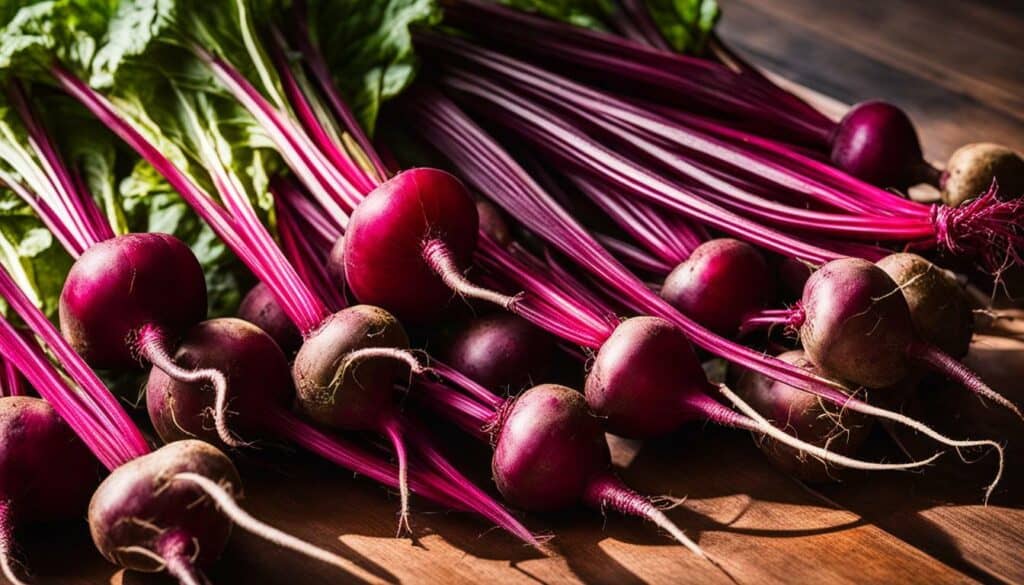
Your Guide to Best Starter Garden Plants for Beginners
These plants are a great starting point for beginners and will provide you with delicious homegrown produce. Remember to provide them with the right amount of sunlight, water, and nutrients, and enjoy the fruits of your labor!
Lettuce – Perfect for Beginner Gardeners
Lettuce is not only easy to grow, but it also thrives in partial shade, making it perfect for those with limited space. Leaf lettuces are the easiest to grow and require minimal maintenance. With regular watering and proper drainage, you will have a constant supply of fresh greens for your salads.
Swiss Chard – A Colorful and Versatile Addition to Your Garden
Swiss chard is a low-maintenance leafy green vegetable that comes in a variety of colors, including the rainbow variety. It can be grown in containers or directly in your garden and can be used in a variety of dishes, from salads to stir-fries.
Beans – Productive and Soil-Enriching Plants for Beginners
Beans are not only productive but also soil-enriching plants that can help improve the quality of your garden soil. With different varieties of beans available, it is important to select the right one for your garden’s growing conditions. With regular watering and proper support, these plants will thrive in your garden.
Potatoes – An Easy and Rewarding Crop for Beginners
Starting your potato crop is as simple as sprouting potatoes and hilling them in your garden. With regular watering and hilling, your potato plants will produce a bounty of delicious potatoes that you can enjoy all winter long.
Zucchini – Low-Maintenance and Abundant in Produce
Zucchini plants are low-maintenance and abundant in produce. With proper watering and sunlight, they are easy to grow and will provide you with an ample supply of zucchini that you can use in a variety of dishes.
Tomatoes – A Must-Have for Beginner Gardeners
Tomatoes are a classic crop for beginner gardeners, and with the wide variety of cherry and easy-to-grow tomato plants available, you are sure to find one that suits your garden’s growing conditions. Remember to water consistently and provide support for your plants as they grow.
Carrots – Low-Maintenance Root Vegetables for Beginners
Carrots are a low-maintenance root vegetable that is easy to grow. With proper soil preparation and consistent watering, you will have a tasty crop of carrots to harvest. Don’t forget to enjoy them fresh or cooked in a variety of dishes.
Onions – Easy-to-Grow Alliums for Beginner Gardeners
Onions are a must-have crop for any beginner gardener. With onion sets and proper soil preparation, you can easily grow your own onions. Remember to harvest them at the right time and enjoy them fresh in your dishes.
Pumpkins – Fun and Rewarding Plants for Beginner Gardeners
Pumpkins are a fun and rewarding crop for beginner gardeners. With proper soil preparation and starting the seeds in the right conditions, you can grow your own pumpkins. With different varieties available, you can enjoy using them for carving, cooking, and making pumpkin puree.
Beets – Colorful and Edible Plants for Beginner Gardeners
Beets are a colorful and edible plant that is easy to grow. With a variety of conical varieties available, you will enjoy harvesting them in the winter months. Don’t forget to use them fresh in your salads or roasted with your favorite vegetables.
Conclusion – Growing Your Own Garden is Within Reach
Now that you know which plants are best suited for beginner gardeners, it’s time to get started! Remember to choose plants that you and your family enjoy eating, and start small with a few plants to ensure success. With the right knowledge and effort, you can successfully grow a vegetable garden this year and enjoy the bountiful harvest!
FAQ
Q: What are some beginner-friendly plants for a garden?
A: Lettuce, Swiss Chard, Beans, Potatoes, Zucchini, Tomatoes, Carrots, Onions, Pumpkins, and Beets are all great options for beginner gardeners.
Q: Which plants are easy to grow for beginners?
A: Lettuce, Swiss Chard, Beans, Potatoes, Zucchini, Tomatoes, Carrots, Onions, Pumpkins, and Beets are all relatively easy to grow and maintain.
Q: Can these plants be grown in containers?
A: Yes, most of these plants can be grown in containers as long as they have sufficient space, water, and sunlight.
Q: Do these plants require a lot of maintenance?
A: These plants are generally low-maintenance and require minimal attention, making them perfect for beginner gardeners.
Q: Can I grow these plants indoors?
A: Some of these plants, like lettuce and Swiss Chard, can be grown indoors, but most of them require ample sunlight and are best suited for outdoor cultivation.
Q: How long does it take for these plants to mature?
A: The time it takes for these plants to mature depends on the specific variety and growing conditions, but most of them can be harvested within a few months.
Q: Are these plants suitable for all climates?
A: These plants can be grown in a variety of climates, but it’s important to consider the specific requirements and adapt them to your local conditions.
Q: Can I save seeds from these plants for future planting?
A: Yes, you can save seeds from most of these plants for future planting, allowing you to continue growing them in subsequent seasons.
Q: Where can I buy seeds or starter plants for these varieties?
A: Seeds and starter plants for these varieties can be purchased from local nurseries, garden centers, or online seed suppliers.
Q: Are there any specific tips for growing these plants?
A: Each plant has its own specific growing requirements, so it’s important to research and follow the proper care guidelines for each variety.
What are Some Beginner-Friendly Plants That I Should Include in My Garden?
Looking to create an inviting garden? Here are some ultimate garden plants perfect for beginners. Low-maintenance options like succulents and herbs, such as rosemary or basil, can add charm without requiring too much care. Colorful blooms like marigolds or zinnias are also beginner-friendly and provide a vibrant touch. Embrace nature with the versatility of ultimate garden plants.
Source Links
- https://www.almanac.com/vegetable-gardening-for-beginners
- https://shiftingroots.com/10-easy-vegetables/
- https://www.lonelypinesfarm.com/top-25-easy-plants-for-beginner-gardeners/
- https://www.gardeningetc.com/advice/best-plants-for-beginners
- https://earthfriendlytips.com/best-plants-for-beginner-gardeners/
- https://www.housedigest.com/1373692/martha-stewart-lettuce-best-vegetable-plant-beginner-gardeners/
- https://www.almanac.com/plant/lettuce
- https://www.marthastewart.com/8319170/easy-lettuce-varieties-to-grow-garden
- https://www.tribtoday.com/life/lifecovers/2023/06/swiss-chard-a-colorful-addition-to-garden-salads/
- https://thegardeningcook.com/todays-harvest-swiss-chard-beans-cucumbers/
- https://gardentherapy.ca/swiss-chard-grow-it-eat-it/
- https://www.almanac.com/content/three-sisters-corn-bean-and-squash
- https://savvygardening.com/easiest-vegetables-to-grow/
- https://www.almanac.com/plant/beans
- https://www.almanac.com/plant/potatoes
- https://www.otoolesgardencenters.com/a-beginners-guide-to-planting-potatoes-in-containers/
- https://www.hgtv.com/outdoors/flowers-and-plants/vegetables/how-to-plant-and-grow-potatoes
- https://savvygardening.com/zucchini-growing-problems/
- https://www.creativevegetablegardener.com/growing-zucchini/
- https://www.almanac.com/plant/zucchini
- https://minnetonkaorchards.com/best-growing-tomatoes/
- https://www.alsipnursery.com/growing-tomatoes-for-beginners/
- https://www.mofga.org/resources/tomatoes/10-things-every-beginning-gardener-should-know-about-growing-tomatoes/
- https://gardeningsolutions.ifas.ufl.edu/plants/edibles/vegetables/carrots.html
- https://www.almanac.com/plant/carrots
- https://www.epicgardening.com/onion-companion-plants/
- https://www.gardeners.com/how-to/growing-alliums/7371.html
- https://savvygardening.com/how-to-grow-green-onions/
- https://www.gardeninginnewengland.com/displayArticle.aspx?id=18
- https://plantperfect.com/get-your-kids-gardening/
- https://www.creeklinehouse.com/how-to-grow-pumpkins/
- https://www.bhg.com/gardening/plant-dictionary/vegetable/beet/
- https://savvygardening.com/beets-from-seed/
- https://gardenerspath.com/plants/vegetables/best-beet-varieties/
- https://www.ncbi.nlm.nih.gov/pmc/articles/PMC6600618/
- https://www.ncbi.nlm.nih.gov/pmc/articles/PMC6372235/
- https://extension.tennessee.edu/publications/documents/pb901.pdf

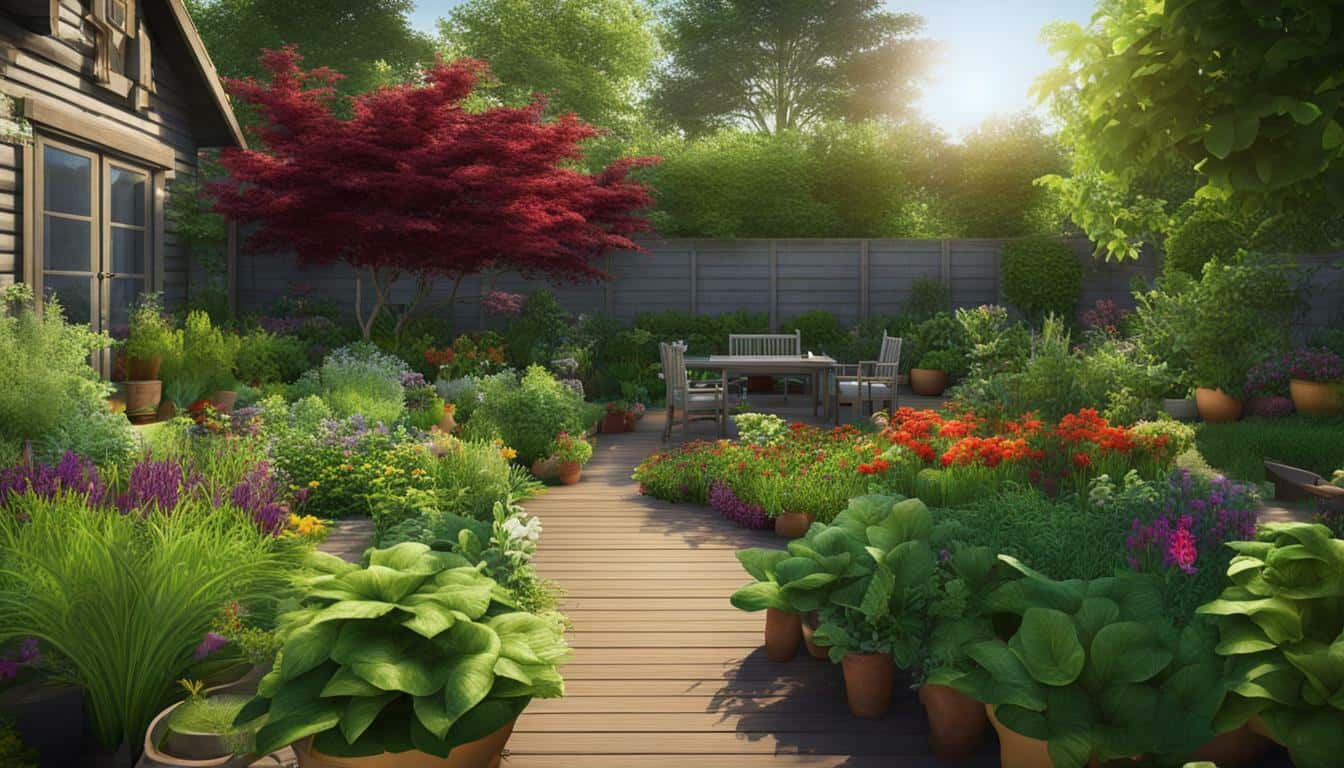
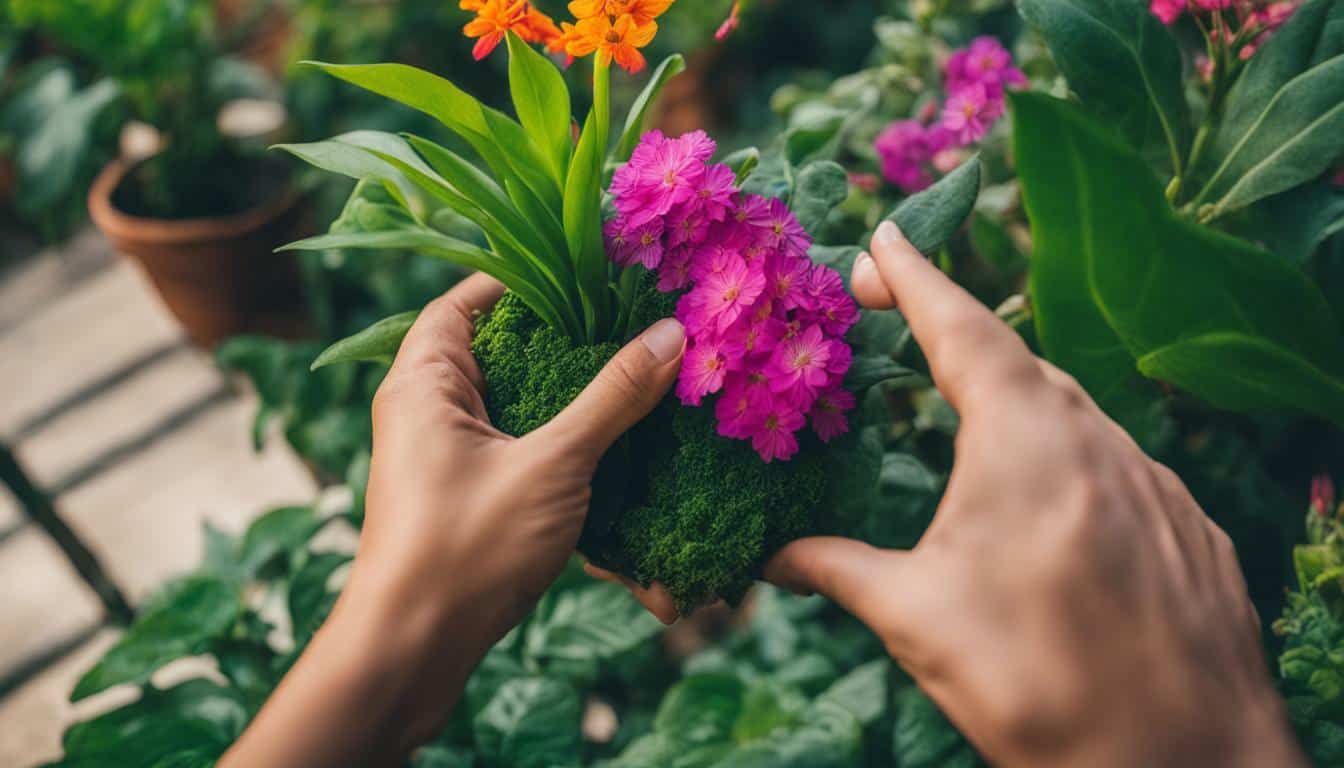
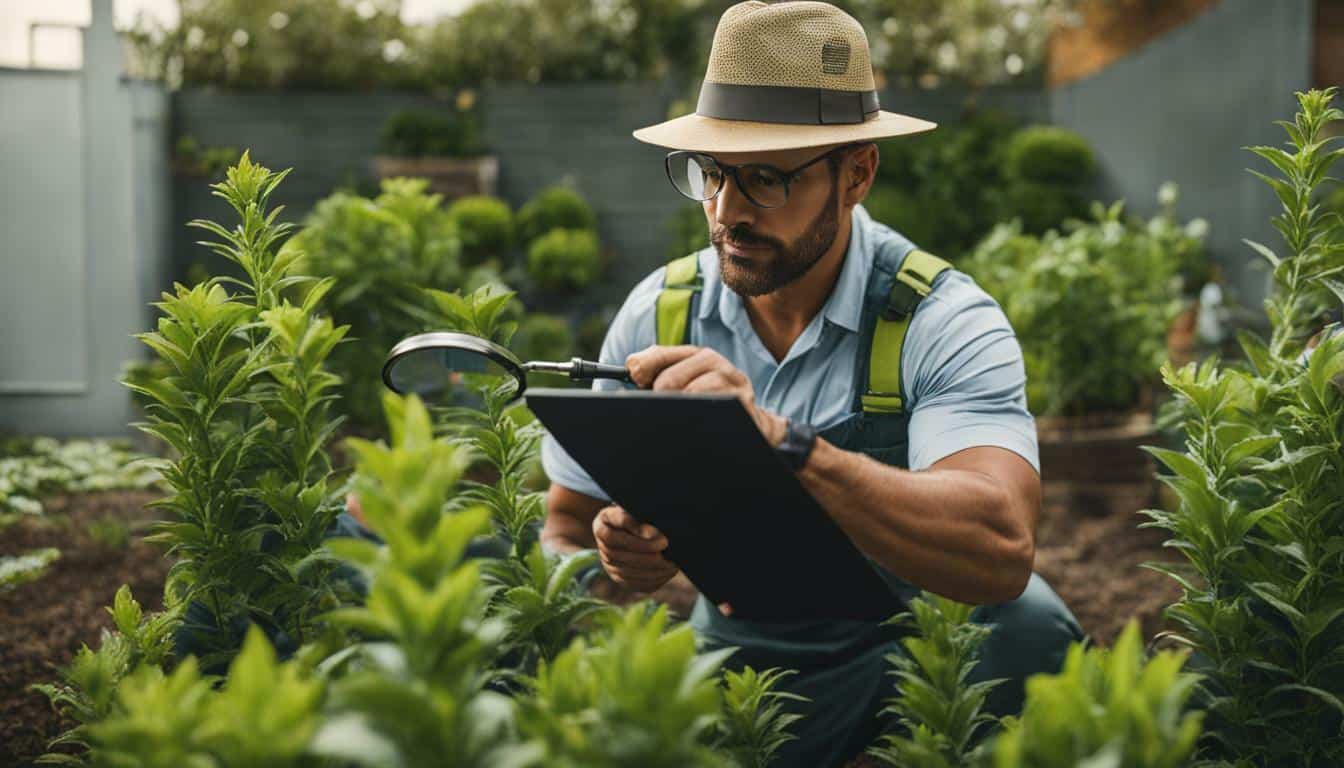

Leave a Reply